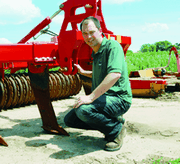Arable Farmer of the Year Finalist – John Barrett

John Barrett – Hill House Farm, Hedenham, Norfolk
John Barrett’s goal for the all-arable unit he has managed from Hill House Farm, Hedenham, Norfolk since 2001 is an efficient contract farming business generating profits both for his employer, Sentry, and his landowners.
However, profit is not the sole aim, he stresses.
“It’s not just about money. It’s also about satisfying our landowners in other things and being able to respond to requests for their farms to be looked after as a whole.
“We’re providing a full farm and estate service.”
That three of the five farms he runs were taken on without them going to tender is proof of his success in both aspects, he believes.
Since he completed the Worshipful Company of Farmers’ Challenge of Rural Leadership course in 2004 the area he oversees has expanded from 500ha to about 1700ha.
“The course taught me how much I needed to step back from the business and lead it rather than actually physically trying to do
| Farm Facts |
|---|
|
Two full-time operators taking increasing levels of responsibility have been closely involved in the expansion.
“We focus on providing training and support to help them grow with the business.”
A strong feature of his operations is collaboration with local farms, including a new autumn cultivating joint venture covering 1800ha, to raise the efficiency of men and machinery.
“My vision for Sentry Norfolk is to double the size of the business in terms of acres within the next four years and double the profit.”
Given the belt of light land that runs through the farms Mr Barrett has already embarked on that venture by more than doubling his sugar beet area this season.
Along with oilseed rape, winter beans and vining peas, the crop is a prime break in the rotations, which concentrate on first wheats.
He acknowledges that with the farm’s average beet yield of 52t/ha (21t/acre) overall performance must be improved.
“We’re aiming at 25t/acre and bought quota accordingly.”
Having much of the crop now on land which has not grown it for several years, if at all, and being able to stretch the rotation from one in three to one in four years should help, he believes.
“I admit it’s a bit of a gamble, but at only £2/t for the quota it isn’t a big risk.”
Budgeted target first wheat yield is 9.3t/ha, and for oilseed rape it is 3.7t/ha.
 Having limited grain storage he adopts a simple approach to varieties, concentrating on feed wheats for local mills to reduce haulage costs with all combinable breaks sold at harvest. Marketing is via Sentry’s dedicated team.
Having limited grain storage he adopts a simple approach to varieties, concentrating on feed wheats for local mills to reduce haulage costs with all combinable breaks sold at harvest. Marketing is via Sentry’s dedicated team.
Liberal use of imported duck and pig muck plus sewage sludge is improving soil structure and significantly lowering the farm’s demand for inorganic fertilisers.
Non-inversion tillage has been the norm for five years, the main aims being to improve soils and reduce the impact of carbon release from ploughing on the environment, Mr Barrett explains.
BASIS and FACTS qualified, he employs Robert Hurren of Agrovista by the hour for field-walking but makes all input decisions himself.
Even though all pesticides come from that firm, Sentry’s buying power and trust deals ensure value for money, he maintains. “It works very well.”
All the farms are in the Entry Level Scheme and all watercourses have 6m buffer zones to ease LERAP compliance.
Looking for opportunities to promote farming’s positive messages Mr Barrett introduced a new enterprise last season – a maize maze, repeated this year in the shape of a “carbon footprint”.
He also opened the farm to the public for the first time last June under LEAF’s Farm Sunday scheme.
CATEGORY JUDGES



Last year’s winner, Robert Law, Philip Wynn, Wynn Business Partnerships and Andrew Blake, Farmers Weekly’s senior arable reporter.
| What the judges liked |
|---|
|

